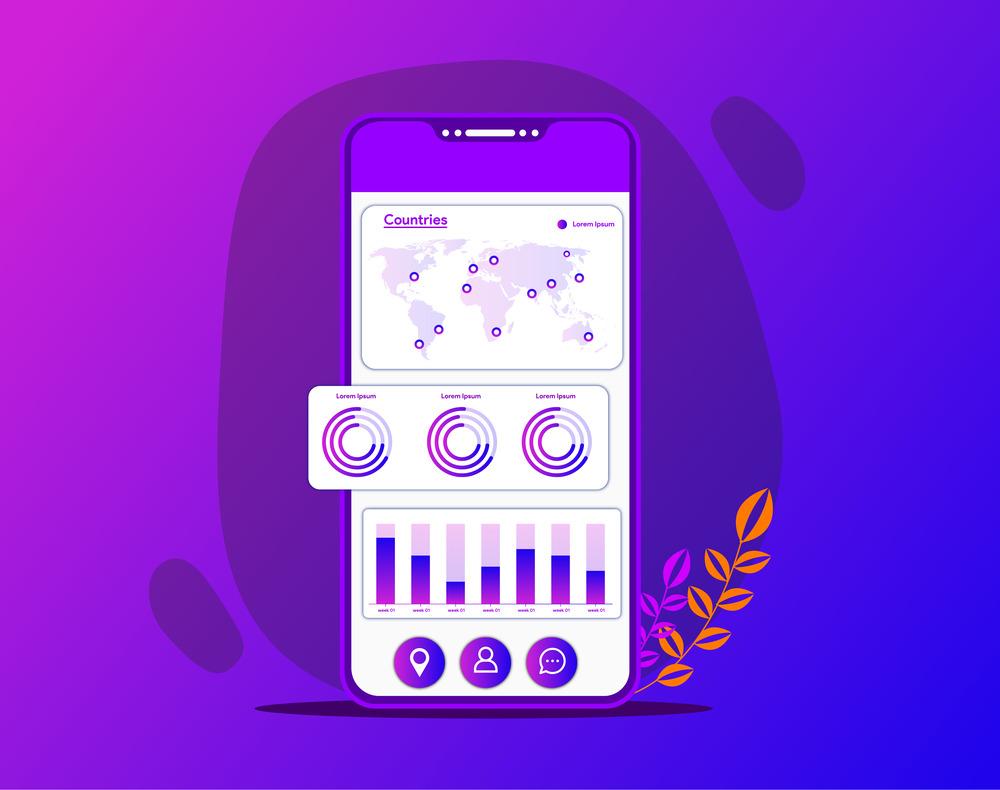
Mobile App Development: Trends & Tips
In today’s digital-first world, mobile applications are no longer a luxury—they’re a necessity. Whether you’re a small business or a large enterprise, investing in a mobile app can unlock growth, enhance customer engagement, and streamline operations. As the mobile app development landscape evolves, businesses must stay ahead of the curve to stay competitive.
If you’re a business owner looking to leverage the power of mobile technology, understanding the latest trends and best practices in mobile app development is crucial. In this blog, we’ll explore the future of mobile app development, key trends that could shape your business, and the essential tips for creating an app that drives results.
Why Your Business Needs a Mobile App
Before diving into the trends, let’s first discuss why your business needs a mobile app in the first place. Here are a few compelling reasons:
- Improved Customer Engagement: A mobile app offers a direct channel to engage with your customers. Push notifications, personalized content, and easy access to your services can help you build stronger relationships with your audience.
- Brand Recognition and Loyalty: Mobile apps increase your brand’s visibility, ensuring your business stays top-of-mind for customers. With features like loyalty programs, special offers, or exclusive content, apps can foster brand loyalty.
- Streamlined Business Operations: From managing orders and tracking inventory to improving communication with your team, mobile apps can streamline internal processes, boosting efficiency and reducing costs.
- Competitive Advantage: With the increasing reliance on mobile devices, businesses with their own apps are viewed as more modern and customer-centric. A well-built app can set you apart from competitors who haven’t embraced mobile technology.
Now that we understand why a mobile app is essential, let’s explore the future of mobile app development and how your business can benefit from the latest trends and technologies.
Key Trends in Mobile App Development for Businesses
 1. Artificial Intelligence (AI) and Machine Learning (ML) for Personalization
1. Artificial Intelligence (AI) and Machine Learning (ML) for Personalization
AI and ML are transforming mobile apps by enabling them to deliver personalized experiences based on user behavior and preferences. For businesses, this means apps that can offer tailored content, product recommendations, and even customer support via chatbots.
For example, an e-commerce app can use AI to analyze user data and suggest products that align with individual tastes. Or, a fitness app could use ML to track a user’s progress and offer personalized workout plans.
By incorporating AI and ML, your app will be more responsive to customer needs, leading to better engagement and higher conversion rates.
2. 5G Connectivity for Real-Time Business Operations
The introduction of 5G technology is set to revolutionize mobile app development. With ultra-fast internet speeds and lower latency, 5G enables apps to handle large volumes of data in real time—perfect for businesses that require quick, seamless interactions.
Consider an on-demand delivery service that uses 5G to optimize routes in real-time, or a remote collaboration tool that allows your team to collaborate without interruptions. 5G opens up new possibilities for creating apps that provide instant feedback, enhance user experience, and offer sophisticated features that rely on speed and efficiency.
3. Cross-Platform Development: Save Time and Money
As businesses look to expand their reach, cross-platform development is becoming increasingly popular. Tools like Flutter and React Native allow developers to create apps for both iOS and Android with a single codebase. This not only saves time but also reduces costs, which is especially important for small to medium-sized businesses.
With cross-platform apps, you can reach a wider audience without sacrificing functionality. Whether you’re targeting customers on iPhones or Android devices, your app will work seamlessly across platforms, providing a consistent experience for all users.
4. Augmented Reality (AR) for Enhanced Customer Interaction
AR technology is gaining momentum across industries. For businesses, AR offers a unique way to engage customers and enhance the shopping experience. Retail apps, for instance, can use AR to let users visualize how a product would look in their home before buying it. Similarly, real estate apps can give users virtual tours of properties without leaving their homes.
If your business deals with products, services, or experiences that benefit from visual interaction, integrating AR into your app can make your offerings stand out and improve customer satisfaction.
5. Integration with IoT and Wearables
The Internet of Things (IoT) is revolutionizing the way businesses operate. By connecting devices to the internet, businesses can collect real-time data and offer enhanced services. Wearable devices, like smartwatches and fitness trackers, also present new opportunities for mobile app developers.
For example, a health and wellness app could sync with wearables to track users’ fitness data in real-time and provide tailored recommendations. Similarly, a smart home app can allow users to control their connected devices remotely. By integrating IoT and wearables, your business can provide more value to customers while gaining valuable insights into their behavior.
Tips for Developing a Mobile App That Drives Business Results
1. Define Clear Business Goals
Before diving into the development process, it’s essential to define clear business goals for your app. Are you aiming to increase sales, improve customer retention, or streamline operations? Understanding your goals will guide the development process and ensure that your app delivers measurable results.
For example, if your goal is to boost sales, your app might include features like an integrated payment gateway, product recommendations, and customer loyalty programs. If your goal is to improve customer service, you might focus on building an in-app messaging system or integrating AI-powered chatbots.
2. Prioritize User Experience (UX)
A seamless user experience (UX) is crucial for the success of your mobile app. A well-designed app should be intuitive, easy to navigate, and responsive to different device sizes. Focus on minimizing loading times, simplifying the registration process, and offering personalized experiences.
Remember, users will abandon your app if it’s difficult to use or slow to load. Investing in high-quality UX design will not only improve customer satisfaction but also increase retention rates.
3. Ensure App Security and Data Privacy
Security should be a top priority when developing your app. As mobile apps collect sensitive user data, it’s crucial to implement strong security measures to protect customer information and comply with data privacy regulations, such as GDPR or CCPA.
Incorporate secure authentication methods like biometric logins or two-factor authentication (2FA). Encrypt user data and ensure that your app complies with privacy laws. By making security a priority, you’ll build trust with your users and avoid costly data breaches.
4. Integrate with Existing Business Systems
To maximize the efficiency of your app, it should integrate with your existing business systems, such as your CRM, ERP, or inventory management systems. This will allow you to offer real-time updates, streamline processes, and reduce manual work.
For instance, a restaurant app could integrate with the restaurant’s POS system to track orders and inventory automatically, while an e-commerce app could sync with your warehouse management system to update stock levels in real-time.
5. Test and Optimize Your App Regularly
The launch of your app is just the beginning. To ensure long-term success, you must continuously test and optimize your app. Regular updates, bug fixes, and new features will keep your app relevant and functional.
Gather feedback from users, monitor app performance, and address issues quickly. Running A/B tests can also help you identify which features resonate most with users, allowing you to refine your app’s offerings over time.
Best Practices for Business-Focused Mobile App Development
- Start with a Minimum Viable Product (MVP): Test your app’s core features before launching full-scale development to avoid unnecessary costs and time.
- Choose the Right Development Partner: Work with experienced mobile app developers who understand your business goals and can help you navigate the complexities of mobile development.
- Incorporate Analytics: Use in-app analytics to track user behavior, identify pain points, and make data-driven decisions to improve your app.
- Focus on Scalability: Design your app with scalability in mind, so it can grow alongside your business and handle increasing traffic and demand.

Why Mobile App Development is Essential for Your Business
In the modern business landscape, mobile app development has become a game-changer for companies looking to stay competitive and enhance their customer engagement. Whether you’re looking to build a custom mobile app for internal operations or a customer-facing app to streamline user experiences, mobile apps provide a wealth of opportunities to improve business outcomes. Let’s dive deeper into why mobile app development is so critical for your business success and how it can drive growth in the digital age.
Mobile App Development: A Competitive Edge for Businesses
Mobile apps are no longer just an optional tool for large enterprises—they’re an essential component for businesses of all sizes. Whether you run a retail business, a service-based company, or an e-commerce store, mobile apps offer a direct line to your customers, improving convenience, engagement, and customer loyalty. A professionally developed mobile app creates a direct connection with users, offering them an easy, on-the-go experience that can significantly boost brand visibility and recognition.
For instance, e-commerce businesses can benefit greatly from a mobile app, as it allows customers to shop anytime, anywhere, with a simplified checkout process and personalized recommendations based on past behavior. In comparison, service-based businesses can use mobile apps to schedule appointments, manage client relationships, or streamline internal operations.
By investing in mobile app development, your business can gain a significant competitive edge, allowing you to provide faster services, seamless communication, and innovative features that set you apart from competitors still relying on traditional methods.
Mobile App Development for Streamlining Business Operations
In addition to enhancing customer engagement, mobile app development can help streamline business operations. Automating tasks, managing inventory, processing payments, and tracking orders can all be done within a mobile app. By shifting key operational functions to a mobile app, businesses can reduce human error, improve efficiency, and optimize their resources.
Take a restaurant business as an example. With a mobile app for reservations, orders, and customer feedback, restaurants can reduce manual errors in orders, provide seamless experiences for customers, and gather valuable data to improve their services. Similarly, a retail business could use a mobile app to manage product inventory in real-time, automate restocking processes, and ensure customers have an up-to-date catalog of available items.
These are just a few examples of how mobile app development enables businesses to improve their workflows, reduce costs, and enhance overall efficiency.

Maximizing Customer Experience Through Mobile App Development
One of the most important aspects of mobile app development is its ability to significantly improve the customer experience (CX). With mobile apps, businesses can provide a personalized experience, tailoring services and recommendations to the preferences of each user.
For example, restaurants can offer customers the ability to browse a menu, place an order, and even customize their meal before arrival. A fitness app could integrate wearables to track activity and suggest workouts based on individual progress, creating a more personalized journey. In e-commerce, mobile apps allow businesses to tailor product recommendations, discounts, and promotions directly to users, increasing the chances of repeat purchases and enhancing customer loyalty.
The goal of mobile app development should always be to enhance the overall user experience. By ensuring that your app is intuitive, user-friendly, and fast, you will not only attract more customers but also keep them coming back. The user experience of your mobile app directly impacts how users interact with your brand, and businesses that invest in improving this experience will see higher customer retention and satisfaction rates.
The Role of Mobile App Development in Data Collection and Insights
Another major advantage of mobile apps for businesses is their ability to gather invaluable data about customer behavior, interactions, and preferences. With the right mobile app development, businesses can collect real-time analytics that help inform business decisions, marketing strategies, and product development.
Through in-app analytics, businesses can track user behavior, such as how often they open the app, which features they use most, and how long they stay engaged with the content. This data can be used to refine marketing strategies, optimize app functionality, and improve user experience.
For example, a retail app can use data on customer preferences to send personalized offers, while a service app might use customer feedback and ratings to improve its offerings. Collecting this kind of valuable data through a mobile app allows businesses to stay responsive to customer needs and make more informed decisions, ultimately leading to greater business success.
The Future of Mobile App Development for Businesses
As technology continues to evolve, the potential of mobile app development for businesses is limitless. With emerging technologies like artificial intelligence (AI), machine learning (ML), 5G connectivity, and augmented reality (AR), the capabilities of mobile apps are expanding rapidly. Businesses that embrace these technologies can create cutting-edge apps that offer even more personalized and engaging experiences for users.
In the future, we’ll likely see more AI-driven mobile apps, which can predict user needs and offer customized experiences. Apps might integrate 5G technology, delivering super-fast data speeds for more interactive and real-time services, or leverage AR for virtual shopping experiences that allow customers to see how products will look in their homes before purchasing.
Conclusion: Why Mobile App Development Is Crucial for Your Business
In today’s digital world, mobile app development is no longer a luxury—it’s a necessity for businesses that want to stay competitive, engage customers, and optimize operations. Whether you’re a retail business, a service provider, or an e-commerce platform, a mobile app offers an unparalleled opportunity to connect with customers, streamline processes, and drive growth.
By leveraging the latest trends and best practices in mobile app development, businesses can ensure they remain agile, efficient, and customer-focused. Whether it’s creating a seamless user experience, integrating AI-driven features, or using mobile analytics to drive decisions, investing in mobile app development will provide long-term benefits that enhance your brand’s presence and overall success.

